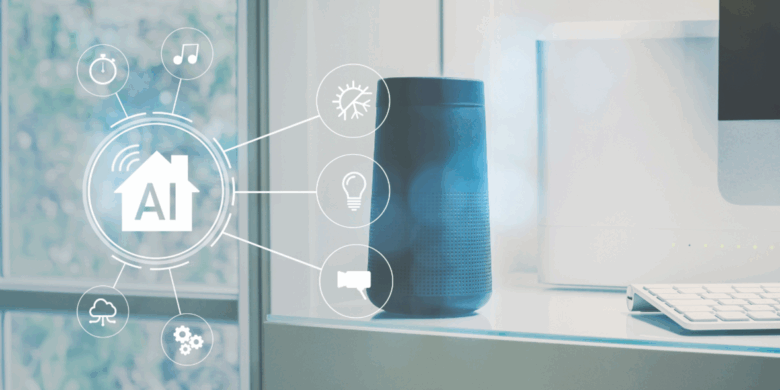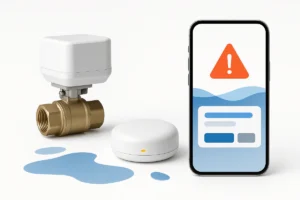Imagine a world where your home can detect and fix problems before you know it. AI makes this possible—and it’s already here. Thanks to AI, home security is faster, more predictive, and more personalized. Gone are the days of clunky security systems and false alarms. AI-powered home security devices are smarter and more automated. From smart cameras with facial recognition to virtual assistants that alert the authorities, AI is becoming the silent guardian of our homes. Technology is changing the way we protect our family and belongings. This article explores how AI is changing home security and what the future holds. Let’s take a look at how AI can make your home smarter and safer.
Facial Recognition, Smart Cameras:
Facial recognition is a powerful AI tool for home security. Traditional cameras can only record but not analyze. Smart AI cameras can now distinguish between recognizable faces, like your kids or friends, and strangers and intruders. This reduces false alarms and only alerts you when something out of the ordinary is happening. These cameras get smarter as they learn trends. They learn your family’s daily activities and can alert you to unusual activity, like someone stopping at your door or trying to enter at odd hours. This technology provides 24/7 surveillance, even at night or during bad weather. Thanks to cloud storage and live streaming, AI cameras can send live footage around the world. Protect your home, even when you’re not there.
Predictive Threats:
The predictive power of AI goes far beyond just reacting. Predictive threat detection is one of the most compelling innovations in home security. AI systems examine behavioral patterns, environmental data, and historical events to predict break-ins. If someone walks past your door at odd hours, the system can alert you before a crime occurs. AI can monitor door and window sensors for disruptive vibrations or pressure changes. It can learn to distinguish between strong winds hitting a door and a break-in. This machine learning technology tailors your security system to your home, making it smarter and more accurate for every threat. AI’s proactive protection makes your home safer than traditional methods.
Automation, Voice Assistants:
AI voice assistants like Alexa, Google Assistant, and Siri are centralizing your home security. Voice commands can now control door locks, cameras, alarms, and lights. Imagine being able to say “safe home” before bed and have your system lock your doors, close your garage door, activate your cameras, and arm your alarm without having to press a single button. Voice automation is not only convenient, but it also provides instant responses. If you hear strange noises at night, ask your assistant to show you camera footage or turn on your outdoor lights. Some systems also offer voice-only emergency notifications. Smart home devices and AI assistants are increasingly being integrated to provide a more connected experience for homeowners. It’s not just about simplifying operations; it’s about creating a seamless, efficient, and secure environment that responds as quickly as you do.
Smart Doorbell Access Control:
Say goodbye to peepholes and goodbye to wondering who’s at the door. Smart AI doorbells offer real-time video, two-way communication, and rapid notifications. Motion detection and facial recognition can lock out non-threatening people like delivery people and the neighbor’s kids. These doorbells can record visitor history, alert you to strangers, and warn you of device tampering. It also works continuously.
With the access control system, you can remotely control who is in your home. You can revoke temporary digital keys for guests, cleaners, and contractors at any time. Artificial intelligence restricts these keys to known users and times. You can monitor and manage access to your home from your smartphone, whether you’re at work or on vacation. This control reduces the need for physical keys and enhances security through biometric authentication and usage logs.
Instant Alerts and Emergency Response:
Instant alerts are a key feature of AI home security. Traditional systems may not alert you until after an event has occurred. AI systems can alert you immediately, giving you time to take action. AI can detect and report events like fires, burglaries, and water leaks within seconds. Your phone, email, or security company can receive these alerts.
AI systems can automatically call emergency services, reducing response time in emergencies. Homeowners can also remotely monitor their properties in real time. Live video, AI analytics, and integrated communications tools can help you respond to threats faster and better. Many systems also provide incident logs and visual evidence to law enforcement. It’s like having a private security team that’s always on call.
Conclusion:
AI is changing home security, and it’s more than just a buzzword. AI is making our homes smarter and safer through facial recognition, predictive threat detection, and voice automation. These technologies fit into your lifestyle, provide instant insights, and give you capabilities that were never possible before. AI is making home security personal, automated, and responsive. Whether you’re a tech enthusiast or just want peace of mind, AI technology is essential to modern life. As technological breakthroughs continue to emerge, security measures will become more advanced and user-friendly. That’s why there’s no better time to integrate AI into home security. AI is making smarter, safer homes possible.
FAQs:
1. How does AI reduce false alarms in home security?
Movements from pets, cars, and trees can all be triggers, but AI can identify security risks. Simply alerting users to suspicious activity can reduce false alarms.
2. Is installing an AI home security system complicated?
Modern AI systems have simple, user-friendly installation guides. Many systems are plug-and-play or app-based, making them easy to use, even for non-techies.
3. Are AI security systems easy to hack?
AI systems have stronger encryption technology and software update mechanisms, but no system is immune. Use strong passwords and choose trusted vendors to improve security.
4. Can smart home security systems work without power?
Many systems are battery-powered and can operate even when the power is off. Cellular networks can keep some systems online when Wi-Fi goes down.
5. Is facial recognition safe and legal in your home?
It is legal to use facial recognition for personal security on private property. It is important to comply with privacy laws and not to store or share data without permission.




